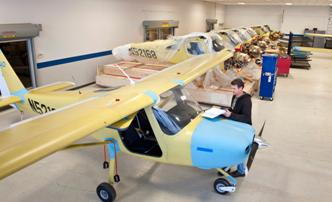|
|||||||||||||||||
|
|
|
|||
|
By Bill Goldston |
||||
 |
January 26, 2011 - Cessna Aircraft has reported at the
annual U.S. Sport Aviation Expo in
?Our |
|||
|
It?s encouraging to see the Skycatcher enter service in such a positive way,? said Jack J. Pelton, Cessna chairman, president and CEO. The company is on track to deliver 150 Skycatchers in 2011, including the first models featuring the McCauley two-blade, fixed-pitch composite propeller.
The
Skycatcher, announced in 2007, is Cessna?s entry in the popular
light sport aircraft category. It features the Garmin G300
avionics suite and a Teledyne Continental O200D engine. Priced
at $112,250, the two-seat, single-engine aircraft has a maximum
cruise speed of 118 knots with a maximum range at 6,000 feet of
440 nautical miles. Fabrication and assembly is centered at
Shenyang Aircraft Corporation in
Designed
as a low-cost flight trainer, Skycatchers have been delivered to
several Cessna Pilot Centers around the country. Cessna Pilot
Centers are independently owned and operated flight training
affiliates that offer Cessna?s proprietary training curriculum
and Cessna aircraft for flight training.
There are
more than 280 CPCs in the |
||||
|
The complete pilot
handbook for the Skycatcher is online. The handbook provides system
descriptions and basic operating parameters. Having it online
complements Cessna?s new online Sport/Private Pilot Course available
through Cessna Pilot Centers. The Skycatcher POH is also available
through the course?s online library. Cessna expects to expand the
program to include an instrument rating course in the future. The new
training program is a key component of Cessna?s effort to make flying
more accessible and to re-energize pilot training.
Customers pursuing
the sport certificate have access to all parts of the Cessna
Sport/Private Pilot Course and can easily move into the
private-pilot-only segments of the course when ready. The Web-based
system keeps track of every aspect of their training and they can access
training materials from any location where they have access to the
Internet. And since it is web-based, changes and updates can be made
instantly, with no replacement materials to distribute.
The Cessna
Aircraft Company is an airplane manufacturing corporation headquartered
in
On 27 November
2007 Cessna announced the new Cessna 162 would be made in the People's
Republic of China by Shenyang Aircraft Corporation, which is a
subsidiary of China Aviation Industry Corporation I (AVIC I), a Chinese
government-owned consortium of aircraft manufacturers. By manufacturing
the aircraft in
On 4 November 2008
Cessna's parent company, Textron, indicated that Citation production
would be reduced from the original 2009 target of 535 "due to continued
softening in the global economic environment" and that this would result
in an undetermined number of lay-offs at Cessna.
On 13 November
2008, Cessna announced that a total of 665 jobs would be cut at its
In January 2009
the company announced 2,000 additional layoffs, bringing the total to
4,600. The job cuts included 120 at the
On 29 April 2009
the company announced that it was suspending the Citation Columbus
program and closing the
In December 2009
the company announced that it will close its three |
|
|
| ?AvStop
Online Magazine
Contact
Us
Return To News
|
|

